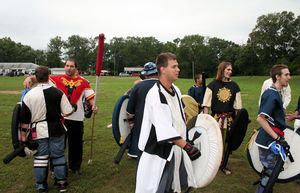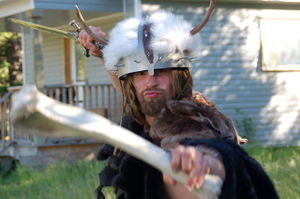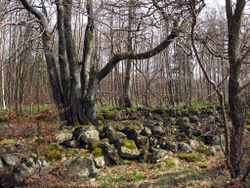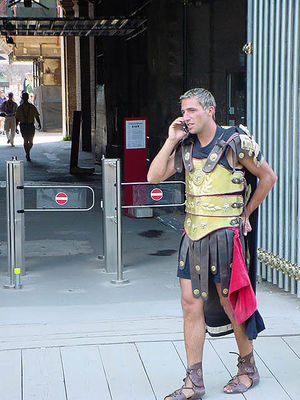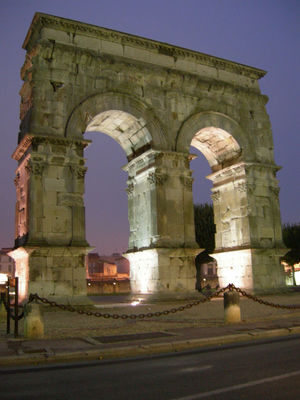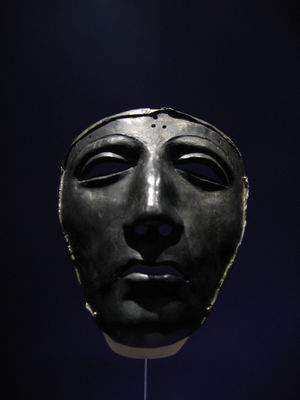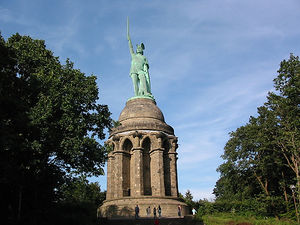Herman the German
This article has been translated from the German Uncyclopedia. If this sort of humour does not appeal to you, you can always get your sheep-loving nationalist ass back to New Zealand. |

Know, O traveler, that between the years when the oceans drank Atlantis and the gleaming cities, and the years of the rise of the Sons of Aryas, there was an Age undreamed of, an age of shining citadels and towers, surrounded by dark, barbaric wildernesses and degenerate sorcery. And in that time when sword and sinew were pitted against magic and devilry from the frozen wastes of the far north to the deserts of Stygia, Herman the German came and claimed the throne of Germania.
Tacitus in the Barbaric Guide To Germany. Published 100.AD.
Herman the German (also Arminius, Armin , Hermann the Cheruscan or just plain Hermy Baby) was the first man with the imagination to wake up one day and say ' I have a dream. I will call my hut 'Germany' and the people who live with me Germans. He eventually extended the idea somewhat but Herman is now credited by his modern day descendants with the concept of Germany.
This 'German' idea seemed particularly attractive to him because Herman pictured himself as the crowned leader on the throne of such a kingdom. To make this dream come true, he shrank from nothing, neither war, nor treachery, ambush, marriage , forgetting his wedding anniversary, kicking puppies..ok..you get the picture. Herman was a bit of a barbaric bastard in other words.
Germania, a Roman province[edit | edit source]
It is the year 7 AD - just after the taverns have closed after a long day of serving wine,women and songs to passing tourists. The developing Roman province of Germania has been established between the Rhine and the Elbe. Prospects for interesting imperial developments look good and Emperor Augustus can thank his legions for a long 20-year war against 'the Hermans' as he called their opponents to persuade the locals of the virtues of Roman civilization. It had been a long and dirty war but all seemed now at peace.
It was about time to mold a well organized Roman province from the primeval forests the Germanic provinces consisted of. For this purpose, Augustus sent a seasoned administrator, Publius Quinctilius Varus, to Germania, in order to build towns, forts, and multi-lane Roman highways. And of course, in order to levy taxes. Varus took a couple of legions but they were mainly expected to direct traffic, maintain law and order and sleep with the local women (or men - depending on preference).
Varus was a great-nephew-in-law to Augustus. He had learnt his military expertise in the eastern provinces of the Roman Empire so was ignorant of life on the Rhine frontier. So Varus thought it wise to hire some local, Rome-friendly counselors and auxiliaries. At this time there were already many Germans who did not enjoy their primeval forests as much as Roman civilization. They could be seen queuing up at the border and crossing over to make a living as immigrant workers in the Roman empire.
One of those German 'friends of Rome' was Arminius the Cheruscan. His original name was Herman Krauske, but he had replaced the German name with the sexier Latin Arminius Cheruscus . Arminius, or Herman, had been brought to Rome in his childhood as a hostage - or what is now called - an au pair. This was not unusual at this time, freshly conquered tribes were often requested to provide hostages (some of the barbarians thought the Romans were asking for 'sausages' - Rome wasn't amused). It is only today that gangsters and terrorists have somewhat discredited the practice of hostage-taking.
Arminius had been offered the best education a Germanic sausage - sorry hostage - could provide. He was granted a scholarship and he had even been allowed to acquire a horseback riding and chariot driving license. Arminius then became member of the Roman equites, or knights, and therefore qualified ideally as a 'Barbarian Stress Counselor' and therefore an ideal adviser for Varus. He was given the command of a force of Germanic auxiliary cavalry and they rode around the Roman countryside to improve their muscles and chase the girls. This impressed many Romans as they were frankly crap horsemen at the best of times and most failed their riding license tests. This meant the Roman armies therefore were forced to rent foreign cavalry as support.
So when the opportunity came for Arminius to return to Germania, he grasped it with both hands and twisted it into a fantastic balloon animals. Impressed with his dexterity, Varus slapped him on the back and 'You're coming on tour with us Arminius..do you want to become an imperial roadie as we conquer Germania for Rome ?.'
The return to Germania[edit | edit source]
It was about the year 7 A. D. (a strange way of putting it, you might say, because at this time nobody would have dreamed of counting the years according to the life of a carpenter's toddler. But that's another story) when Arminius returned to Germania in the entourage of Varus. He was a young and dashing cavalry officer and received a cheerful welcome at home. Imagine a merry banquet in his home forest arranged by his family for Arminius and for Varus and flocks of friends and family. One of the invited guests was the chieftain Segestes, a particular friend of his father.
All the Cheruscans were very fond of Rome at this time, and when Segestes heard that a big company of Romans were going to hit the forest for a party, Segestes was determined to present his cute daughter Thusnelda and to marry her off to a noble Roman. However, when people were seated at the banquet, Thusnelda was placed next to Arminius, of all people. And now, the hormones took over.
The conversion of a Roman to a German[edit | edit source]
Since childhood, Arminius had not met a German woman. He had lived through puberty in Rome, his first experiences with women he had with Roman girls. Like many of his German co-hostages he had been handed round like an oddity from one orgy to another. But now, instead of a tender, civilized, perfumed, hair dressed, black-locked Roman woman, he met a sturdy, beer-drinking, bellowing, long-haired blonde with hair on her arms. He learned that she could ride (even on horseback), hunt, fish, cut trees, climb trees, yodel and whatever was necessary in a primeval forest every day. Arminius was smitten in seconds and arse over heels in love with the forest dwelling fraulein.
Thusnelda herself was impressed as well by the far-travelled Romano-German warrior, and when the night proceeded and beer and mead did their work, the two already discreetly looked for a haystack or another convenient place for an amorous meeting. But Segestes put a stop to the sweet talk before things started to become interesting. He did not at all like the idea of his daughter being courted by a German, when at the same time a couple of attractive Roman noblemen were at hand. Segestes pulled Thusnelda away and chained her to his tent for the night. She was now for the Romans only - no locals allowed.
In all probability, more than this happened in this fateful night. Maybe Varus made some beer-invoked dirty jokes about Thusnelda that were received very badly by Arminius. The complete history of this night is still a matter of debate among archeologists, but we can safely assume that Arminius, influenced by beer, anger, and longing, made three important decisions: first, to hate the Romans from now on, second, to become a true German once again, and third, to marry Thusnelda one day no matter what her father or anyone thought about it.
In a way, Arminius converted from a Romanised German back to an "original" German. And we all know that a convert is the greatest zealot in most cases. Suddenly, nothing could be German enough for him, he wanted to be more German than the other Cheruscans who had come to terms with Roman rule quite well. In secret, he began to tell horror stories to his German cavalry warriors: the Romans would force people to pay staggering taxes, to wash and to shave, to wear weird bed sheets as clothes and to eat unspeakable exotic meals. Within some months he managed to turn the mood of the German auxiliaries.
At this point we have to mention that a short time before, another German leader had succeeded to annoy the Romans. This was Marbod, king of the Marcomanni. He had established his own kingdom in the East and had escaped Roman conquest by a mixture of skill and luck. Therefore, Arminius could, with some justification, say that Rome was not invincible. The idea to create their own kingdom for the Cheruscans seemed very attractive to him. And he had an idea who could become king, too.
After persuading a big number of German warriors that Rome must be fought, one day Arminius mustered his forces and addressed them with a speech. This was part of his Roman education: a general - or someone who aspired to be a general - had to address his men with a rhetorically perfect oratory and fill them with fighting spirit. And this is what he said:
"Friends! Germans! Countrymen! We have a huge task at hand! Against us there is the whole Roman army, a fearsome force, a disciplined war machine, never defeated in open battle in the last hundred years or more! How are we to attack them? Will we do it with guile, perfidy, and treachery, like cowardly Loki would do it? Or will we meet them straightly, openly, like Odin would do it, hand to hand, and spill our blood for the good of our beloved homeland, and enter Valhalla right away with our swords raised, if Odin so decides?"
The evil is always and everywhere[edit | edit source]
The Germans were enthusiastic about their young, charismatic leader, who even asked his men for advice in warfare! The intricacies of his polished Roman rhetorics were lost on them, however. And so they answered his rhetoric question and shouted "Treachery, of course! ... Ambush, Ambush! ... Guile and perfidy! Go Loki Go!"
Arminius had actually expected a different reaction of his warriors. But after some serious talk with his innermost circle of advisers, he allowed himself to be persuaded that a dead hero had fewer chances for a bid on the Cheruscan throne than a living traitor. However, he put forward one condition: For the next two thousand years, no one was to learn the true course of events of the battle, and even the place of the ambush should be kept a secret forever. These measures were intended to preserve some of his chances for an honourable mentioning in future history books.
While our German heroes planned their heroic treachery they did not suspect that a dirty traitor was among their number. Segestes, seeing his dreams of becoming father-in-law to a noble Roman destroyed by Arminius, had overheard enough of his plans and decided to denounce the whole affair to the Roman authorities. He called on Varus in his headquarters and tried to explain the trap Arminius would set for the Romans. Varus considered: Could it be true that the Germans, including the German auxiliaries and Arminius himself, were all traitors? Or was it just a petty act of revenge by Segestes who still advertised his little girl as an ideal wife to every noble Roman he got hold of? He found nothing suspicious with Arminius, apart from the fact that he did not show up as much in the bath houses the Romans had begun to erect everywhere in Germania lately.
No, Varus had known rebellions in Syria and Judea and quenched them, and compared to those oriental fanatics, the Germans were harmless like choir boys. If somewhere in the German forests some of them would try a revolt, he would be there and punish them, but he did not expect serious problems. He therefore fobbed off Segestes with some phrases of his rich political verbiage and politely shooed him out.
Afterwards, the Roman army started preparations for a march, because the end of summer was near. Occupying Germania and establishing it as a Roman province was one thing, but it did not yet call for spending the winter in the German primeval forests. Next to the Rhine already a couple of army camps and cozy Roman colony towns like Colonia had been established where they were already making 'Aftershave For Barbarians' (Eau de Barbarius) to soften the rough German bathing habits. Varus planned to retire there with his army for the winter. He even considered a couple of weeks home in Rome, in order to visit a theatre or maybe a crucifixion or some other entertainment.
Just when the Roman baggage train was about to move, Arminius rode into the camp and asked to see Varus. Breathlessly, he reported that a couple of lesser German tribes had started to stir up trouble, to chase away Roman tax collectors and to paint caricatures of Augustus and Varus on the Externsteine, a significant rock formation which could be seen for Roman mile and miles. Varus was outraged, but at the same time he was quite content to have some action for his legions after the quiet summer, so that they would not grow fat and lazy. He asked Arminius where the rebellious tribes were lurking.
The answer in the Teutoburg forest was not really helpful for him, however, since he did not know all the Germanic forests by name yet. In fact, the so-called Teutoburg forest did not exist at all, it was just an invention by Arminius who wanted to avoid later historians to locate the site of the imminent battle. He made up a map for Varus and told him that it would be just a slight detour on his way to the Rhine, the legions would be able to march on well-maintained paths, teach the rebels a lesson and be home in time for the beginning of the circus games in September.
After these words Arminius mounted his horse again, muttered something to the effect that he would gather the German cavalry auxiliaries in order to support Varus, and made an elegant German departure. Varus did not suspect anything, rubbed his hands and commanded his legions to follow the path Arminius had pointed out.
A walk in the forest[edit | edit source]
But what looked like a fine path first, turned to a nightmare within a few days. The legions could not march in wide formation but had to advance in double file on a narrow trail. With approximately 20,000 men on the march, which meant that the rear guard could not start marching before noon, while the vanguard had to stop short after noon already and start pitching up the tents. In between, not only the fighting troops moved but also the wagon train that transported food and fodder, arms and war machines, pay for the legions, and the luxurious portable households of the officers. Romans where well known for their marching speed, but in the depths of the German forests they could only move at a snail's pace.
Varus followed the Roman army instructions to the letter. Every night he ordered a proper camp to be staked out, fortified with earthworks and palisades, and played football with a severed head for his soldiers. In secret Varus found time to invent new taxes for the Germans who caused him so much trouble. A tree tax or how about a rain tax, a tax for wearing a beard and animal skins. There were plenty of ideas. Still - the rain tax seemed to be best as it seemed to Varus that it was raining permanently in Germania, or at least in the part he crossed at this time. Wagons often stalled in the mud, the coins in the treasury began to rust, the legionaries were wet, cold and coughing like 20 a day smokers. Most of all, they were homesick and dreamed of large bowls of steaming spaghetti served by slave girls in road side tavernas. God they hated Germania and Germans and wondered why their Emperor wanted to conquer such a rotten place.
Then the German attacks began. From the depths of the woods suddenly spears and other missiles were thrown on the marching train. Idlers were trapped by German cavalry. The wagon train was plundered. Trees suddenly toppled over and tumbled on the legions. The vanguard was ambushed. The Roman centurions dispatched messengers to each other with panic messages and contradicting orders. Varus skimmed through his campaign handbook with trembling fingers but it seemed that the chapter How to repel irregular attacks in difficult terrain had been removed by someone. Finally he made a decision and the trumpeters were ordered to give the Entrench! signal.
Thereupon the legionaries started to erect emergency camps, quickly cutting trees down for palisades, digging trenches and latrines. Not easy when you are being hit by German spears all the time. In the middle of the work, other trumpet signals where given, like Decamp! , Lunch break! and We're All Sodding Dead, Varus!. It seemed that the German auxiliaries had placed their own trumpeters on some surrounding hills, giving their own signals and confusing the Roman chain of command.
It took three days until the complete Roman force had perished in chaos and confusion. The soldiers who were not cut down by the Germans got lost in the depths of the swamps or died from post traumatic 'you were massacred mate' stress disorder. When Varus realized that he had brought an epic defeat onto Rome, he despaired and fell onto his own sword. (In case of a terrible defeat or embarrassment, falling onto your own sword was the proper course of action for a Roman patrician and was trained regularly.) Only a couple of Roman legionaries escaped the horror and somehow made it to the Rhine within the next weeks.
Victory! Plunder! The Germans jumped at the possessions of the Romans, collected arms, wagons, provisions, tax and pay coins, horses, and officer's valuables. Many a German warrior on this day received his first sandals or a plush-trimmed helmet. And then they feasted, drank, and ate. Grilled Roman, skewered Roman, Roman in mushroom sauce, Roman stew - the Germans ate until they dropped. The remains were sacrificed to the gods.
And Arminius was the hero of the day. He could actually start carving a crown for himself. But before this he had to attend to some other matters. First, he commanded that most of the Roman remains be collected, removed to a place far away and buried there in a vast area. This was intended to make sure that the true place of the battle would never be discovered in the future.
He distributed the legion eagles of the three legions to the participating tribes as trophies. The head of Varus was cut off and sent to the king of the Marcomanni, Marbod (see above). He did this either to boast or to encourage Marbod to attack the Romans himself now. Marbod, however, did not do him the favour. Instead, he carefully wrapped the Varus head in beautiful gift wrapping paper and forwarded it to emperor Augustus, asking him to please leave the Marcomanni in peace, it was not their fault.
When Augustus received the Varus head, he started to brood. The head was about everything that was left from three legions in Germania. And even this remainder was somewhat shabby, now. He placed the head on a pedestal and said: "Quinctilius Varus, give me back my legions!" The head did not answer. At this point in time, Augustus was older than seventy already, he had ruled Rome for about fifty years and his mind had become a little groggy so that he even started to speak with the heads of dead generals. He also did not last very much longer after that. In one of his last clear moments he told his heir and successor Tiberius to give up conquering Germania - should the Germans fight among themselves instead of battling with Rome.
Friends and family[edit | edit source]
This concludes the action-packed part of the Herman story. Now things are going to be rather melodramatic so get out some hankies if you are tender hearted. If you remember, the lovely Thusnelda was one of the key factors that had made Arminius turn from being a Latin lover into a German gouger. Now that he was truly bloodied - Arminius wanted to renew is acquaintance with the barbarian girl of his life and improve his personal happiness rating to 100%.
He rode to Segestes and presented himself as the new king of the Germans. Arminius tried to dispose the other lord to agree to a marriage between him and Thusnelda but Segestes gruffly declined. Even after Arminius's victory he stood with Rome. The two men started to quarrel, then snarled and tried to lunge at each other with their teeth but both remained stubborn and neither wanted to back down.
Thusnelda overheard the quarrel and resolved to ride away with her lover. She sneaked out of a back door and jumped to him into the saddle. Holding each other tight, they galloped away. The Segestes family did notice she was missing until the next morning. Segestes swore on the nipples of Woden that he would be revenged on Arminius but this meant nothing to our war hero. He and Thusnelda slid off their horse and with the blessing of a local tree druid - married on the spot and ran into a lake to consummate their pagan passions.
Arminius and Thusnelda's honeymoon was vibrant, vigorous but brief. The time span was just sufficient for Arminius to get his newly married wife pregnant. After all, he needed an heir for his future dynasty. While the two were in the process of getting Thusnelda pregnant, Segestes entered the bridal chamber together with a handful of beefy friends, knocked Arminius down and forced his daughter to return to her family. She was placed under custody in one of his fortified holiday hill top fortresses.
Arminius, of course, could not put up with that. With his head still a little dizzy, he called out for his loyal German cavalry in order to steal back the already twice-stolen bride. His followers did gather obediently, but when the band arrived at Segestes' castle, they did not accomplish anything. They found out that it was easier to destroy a frightened Roman army than capture a castle on horseback. Not that Segestes' castle was particularly well fortified, as most of the castles at that time it was built from wood, wickerwork, spittle and horse dung. A couple of seasoned arsonists would have made short work of it, but of course Arminius could not do it that way, as long as his beloved wife was held prisoner inside. Therefore, he ordered his men to dismount and settled for a long siege.
Thusnelda waved to her lover behind a barred tower window, while she terrorized her father's staff with strange cravings for pickled cucumbers and sweet yoghurt. She sat down to grow her hair to help him climb up and rescue her, but Thusnelda's attendants reckoned it would take 10 years for her hair to reach the ground. Arminius sat brooding in his tent whilst his warriors restlessly rode around the castle when suddenly the Romans reappeared on the scene.
The Avenger[edit | edit source]
They had a new general: Germanicus, son of Drusus, great-nephew of Augustus, adopted son of Tiberius, and also otherwise connected and related to all Romans worth mentioning. Rome expected him to rectify the shameful consequences of the battle in the Teutoburg forest. He was given eight legions and even before setting foot into Germania he was named Germanicus. With his huge force he began to roam Germania and soon wondered why he did not meet any Germans anywhere. He could not know that all the Germans were out on some family business at the moment.
Although he did not find any German warriors, he found something else: the location of the Varus battle which was not yet overgrown with grass. At least he could try to cover up the whole embarrassing affair there. He made sure that any remains of Roman legions (mostly clean bones and some napkins) where properly buried. Then he swore his own people to secrecy and never to disclose the place of the horrible defeat. This was one thing where his own wishes were perfectly concurrent with the wishes of Arminius.
After the cleaning up process, Germanicus did not really know how to proceed. But then a carrier pigeon, sent by Segestes, arrived. It carried a verbose air mail where the German lord reported that he was under siege by Arminius. All Romans in the area were kindly asked to hurry to his rescue. Segestes promised a rich reward for that.
This did sound fine indeed. Germanicus enjoyed the carrier pigeon grilled with some wine sauce and then set out to march into the direction given by Segestes. Nobody told him that it might be a bad idea to follow directions given by a German. The Romans who had had to learn this lesson could not any longer retell it.
But this time, everything went fine. At least the Romans were not ambushed in difficult terrain. Instead, they managed to get lost all by themselves in the German forests. Like Varus before, Germanicus also tried to discipline his legions by issuing trumpet signals. He did not succeed entirely, but the Germans inside and outside of Segestes' castle heard the signals and therefore knew that a Roman force was approaching.
Arminius was irritated. If he only had brought his own Roman trumpets! He could have wrought confusion among the legions again! But not this time. His lieutenants pressured him: they wanted to know if they were to continue the siege, or to attack the approaching legions, or simply to go home.
Arminius once again listened to the trumpets and found that it was quite a big number of trumpets approaching. Many more trumpets than Varus had brought. And more trumpets meant more legions. He was not interested in being crushed between a superior Roman force and the followers of his involuntary father-in-law. But he did also not want to be regarded as a sissy by his warriors, so he told them: "We will do something completely different, something they never will expect!"
The Germans aborted the siege, rode some hundred miles southeast and began a battle against the Marcomanni. This meant that Arminius could score a couple of away points and save his reputation with the Germans. It was a brilliant political and strategical move, but his new family was destroyed for good. He was forced to leave Thusnelda and his unborn heir behind.
When the Romans arrived at Segestes' castle, they could only see from the big dumps of horse dung that the castle had been under siege. Segestes enthusiastically welcomed Germanicus as his deliverer. However, when Germanicus asked for the promised reward, Segestes collapsed in a coughing fit. Then he recovered, remembered his original designs and offered his daughter as a bride to Germanicus.
Actually, Germanicus had thought of a more monetary reward. But when he looked around in Segestes' domicile, he realized that not much money was available here. Thusnelda was dragged before him and pushed forward her lower lip sulkily, but the highborn Roman found her attractive anyway. Of course he was not in the least interested in marrying her, but he considered her a welcome entertainment during cold German nights. She was placed on a cart and taken with the Romans. Segestes was happy beyond all bounds and immediately asked to be allowed to join the Romans as well. After the latest episodes he thought better of staying any longer in Germania without Roman protection.
Let's call it a draw[edit | edit source]
Together with eight legions, Thusnelda, and Segestes, Germanicus aimlessly wandered the German wilderness in the following years. When he tried to drag Thusnelda into his tent one lonely night, she made it clear to him that she was wife to Arminius and prospective mother to his heir. This stopped further advances by Germanicus, but on the other hand, she offered some leverage to Germanicus against Arminius. Germanicus did try to blackmail Arminius with his captured wife, but his black mails were not delivered due to the poor mail infrastructure in Germania.
In the course of these campaigns, several more battles were fought between Romans and Germans. The battle at the long bridges almost spelled doom for the Romans: In a thick fog they arrived at a place that looked like a bridge. When they entered the bridge, however, they found that the bridge never seemed to end. In fact it was not a bridge but a dam fortified with planks, that led through a vast swamp. At one point, the dam simply ended. The Romans solved the problem by removing the planks from the beginning of the dam and adding them to the end, so that they could continue their march. When the fog cleared for a while, they could see the Germans in a distance, who built another dam and marched on it. It seemed Arminius wanted to intercept them. But nobody was better at bridge building than a Roman, they won this bridge building contest several miles ahead. The Germans preferred to return into the fog, then.
The next skirmish took place at a site called Idistaviso somewhere on the banks of the Weser river. Here, the Romans succeeded to surround the Germans. With a gasp, Arminius realized that he was about to offer a fair and open battle to the Romans. He realized this just in time and issued a signal to retreat so that only a few of the Germans were slaughtered.
The last action worth mentioning is the Angrivarian Wall Battle. To understand that, one needs to know that the Angrivarians and the Cheruscans were neighbouring tribes of old, and there had been many conflicts and hassles between those neighbours. Once, the Angrivarians complained that the Cheruscans would make too much noise at their parties and celebrations, and the barbecue smell was a nuisance. Another time, the Cheruscans complained that the Angrivarians would not clip their trees nor pull out the weeds properly. From today's perspective, such a sort of pointless arguments seems all but incredible, but at that time it was not unusual. After this quarrel continued for some centuries, the elders of both tribes hat agreed that the only possible solution was a strict separation of both tribes. Therefore, an earthwork was erected over several hundred miles with a palisade on top, dividing the Cheruscans and the Angrivarians. This finally brought peace.
And at this said Angrivarian wall, the last encounter between Romans and Cheruscans took place. This battle was also won by the Romans, at least this is what Germanicus commanded the Roman historians to write down. And the Germans had no pen and paper with them. Anyway, the Germans were far from defeated after the battle. They simply retreated back into the woods, shouted abuse and produced more fake trumpet signals for fun. Germanicus was fed up. Again and again he was victorious against the Germans but he had nothing to show for it.
This was particularly infuriating because right in this moment he was harassed by a Roman quaestor. Tiberius had sent the quaestor, allegedly to support him, but a quaestor was more or less something like a tax inspector today and equally popular. Tiberius had received favourable reports from Germania all the time, reporting Roman victories, but he also had forked out incredible amounts of money and supplies for the legions, and at last he wanted some tangible results. According to all the reports written by Germanicus, Germania should have been conquered several times over now.
The mentioned quaestor wanted to know details now and Germanicus had to come clean. He had fought in Germania for several years, shooed eight legions through the wilderness and worn out some ten thousand legionaries. All he had to show for this was a couple of German captives, most of them having followed the Romans voluntarily, except Thusnelda and the son of Arminius who had been born in the meantime and named Thumelicus.
When Tiberius learned how things were in Germania, he obviously had enough by far. His first impulse was to throw Germanicus to the lions, but this was not an option, because Germanicus happened to be the designated next emperor. This was something Tiberius had had to promise to Augustus on his deathbed, he had even been forced to adopt Germanicus for this purpose. Tiberius had to think of something different, and quickly, before Germanicus could ruin the Roman public finances forever.
He therefore used a method that is still used today when an incompetent personage is to be removed: Tiberius made an announcement to the whole Roman empire that Germanicus had fought victoriously all over Germania, and called him back for a triumph. Afterwards, Germanicus was sent to Asia, allegedly in order to win more victories for Rome, but in fact he could be finished off discreetly there.
And suddenly, the Germans were alone again in Germania. At long last, Tiberius took the advice of Augustus and left the Germans to their own conflicts. The legions retreated behind the Rhine, built a couple of beautiful towns there that still stand today, and only now and then left for a little expedition on the other bank of the river in order to keep the Germans from settling there. The rest of Germania was German now.
Decline and fall[edit | edit source]
Of course the sudden silence first seemed suspicious to Arminius. He stepped out of the woods with his warriors and looked around, but no Roman anywhere. He tentatively issued all Roman trumpet signals he knew, but there was no answer. Then he no longer hesitated and sent messengers to all German tribes telling them that the Romans had left. And he, Arminius, was the one who had driven them out.
The reactions of the other tribes were restrained. Some sent a greeting card or an invitation for a quiet day out fishing.
Arminius had assumed that his aspirations for kingship would take off now after the Romans were gone. But most Germans thought otherwise. Without the Roman threat, they felt they had finally enough leisure now to hunt the elk again or to brew some mead, or just to have a proper fight among themselves. No military leader was needed for all that, let alone a king. The Germans went home and pursued their hobbies.
The loyal cavalry warriors who had followed Arminius during the last years stayed with him but grew restless. At some point one of them asked if a regular professional warrior force should not be paid regularly as well. And Arminius knew that his power would dwindle if he could not find an adequate adversary in the near future. To keep his warriors occupied, he campaigned all through Germania, tried to start a war if possible but that seemed not to catch fire. He also wrote letters to a couple of Romans he still knew, asking them if Rome could not spare an army or two for another Germania campaign. But he only got refusals.
One day he received a letter from his beloved wife, Thusnelda. She had been placed in a little flat in Ravenna together with their little son, and she was thrilled about the shopping malls in the vicinity. Before that, she had walked in Germanicus' triumph and met interesting people of the Roman society. Now she regularly visited theaters, circus shows or orgies. Thumelicus was fine and made good progress in Latin.
A couple of years after the Romans had left Germania, Tiberius received an offer by a petty German lord who said that he could remove Arminius by poison. Tiberius politely thanked but wrote back that Rome was quite content with the status quo and with the Germans occupied with fighting other Germans. He therefore could not allocate funds for poisoning Arminius.
Even though nobody was willing to pay for it, Arminius was killed by a jealous relative in the year 21 AD. It was not a hero's death since this concept was not yet invented in Germania. In fact, Arminius' death was not even noticed for a while among the petty quarrels in Germania at that time. This shows that Germania was really not ready for kingship. And this state of affairs continued for a couple of centuries.
Reception[edit | edit source]
While in Germania nobody took notice of Arminius and his death, some people in Rome indeed appreciated his significance. Tacitus wrote: Arminius, without doubt Germania's liberator, who challenged the Roman people not in its beginnings like other kings and leaders, but in the peak of its empire; in battles with changing success, undefeated in the war. Thirty-seven years he lived; twelve he commanded; and, amongst these barbarous nations, his memory is still celebrated in their songs. This last was not entirely true. More likely Roman matrons sang of Arminius to their children, and mostly when they had been naughty.
Only with the reformation, Arminius gradually returned to fame. Martin Luther re-launched him under the stage name Herman. Scholars began to dig up old writings and read the story of the Teutoburg forest battle. A search for the site of the battle began, but since Arminius had prepared for this, no one was able to locate it. Instead, rumours and conspiracy theories began to develop around the battle.
In the 19th century, when Germany was invented, Arminius had a full-blown comeback. In the voting for a German national epic, however, he made only second place after a certain Siegfried. Anyway, he received a fine memorial near Detmold and looks west from there with his sword raised. (Due to his winged helmet he is sometimes mistaken for Asterix, however.)
In the 20th century, the German national sentiment was damaged by a horde of wretched Nazis and the demand for national heroes collapsed. This state of affairs more or less continues until today. Only the World Cup Germany 2006 finally was able to repair the worst consequences of the Second World War, but for Arminius, times are still tough.
